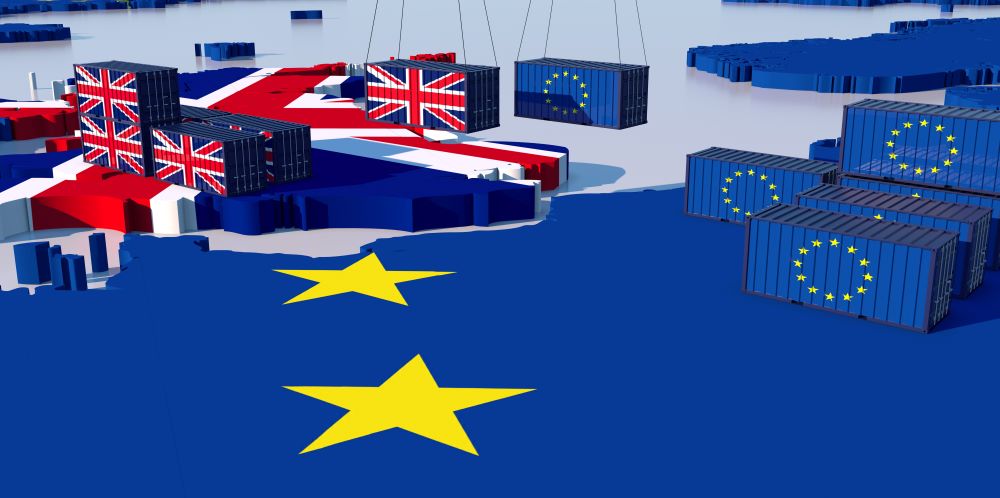
British traders paid an additional £600m in customs duties over the first half of 2021 due to complications arising from the rules of origin in the UK’s trade agreement with the EU – a deal which nominally removed tariffs for all goods.
The complexity of the rules was highlighted in January by Marks and Spencer when it said imports of its much-loved Percy Pig sweets from Germany faced tariffs when being re-exported into the Republic of Ireland.
According to the Guardian, analysis of HMRC data showed that businesses paid £2.2bn in customs duties compared with £1.6bn in the same six-month period last year. Around 2,000 food products were affected by rules of origin.
Not ready
Companies have complained that they were not given enough time to prepare for the complexities of post-Brexit trade.
“We didn’t actually see the black and white of the text until Christmas Eve, and that didn’t give companies a lot of time to understand the implications,” said Fergus McReynolds, the director of EU and international affairs at Make UK.
He said there was anecdotal evidence that some companies have opted to simply pay the tariffs for ease of trading.
Trade more complex
An IOE&IT webinar to 2,000 companies earlier this year found that only about a third were confident they understood rules of origin.
IOE&IT Academy director Kevin Shakespeare highlighted that rules of origin would make trade with the EU more complex.
“Where goods are wholly obtained in the UK things will be more straightforward,” he said. “For more complex elements – such as goods entering Great Britain from the EU before then being re-exported back to the EU – you have an element of complexity.”
Providence
Rules of origin are criteria that determine the economic nationality of goods so that businesses trading the goods can avail of the benefits of trade deals, including removed or reduced tariffs.
To work, companies must be able to prove where the goods or parts they are importing come from.
For complex products there are limits to the proportion of the product (i.e. the material used in its manufacture) that can be from outside the free trade area created by the agreement – i.e. the UK and EU.
Complex
The BBC reports that rules of origin in the UK-EU trade deal are complex, taking up 50 pages of the final document.
They also vary by product. For example, with honey, the maximum amount that can come from outside the UK-EU area is 20% of the weight. With meat, nothing can be from outside the area.
For electric cars, from the end of 2026, none of the battery pack can be made outside the area.
Transformation by processing
There are allowances if the amount of processing of a product is judged enough to transform it into a different product, but again the rules are complex.
James Kane from the Institute for Government told the BBC that the food sector would be hit harder than other industries and that tight margins increased the problem.
“In all other sectors you would probably just pay the tariff,” he said, adding that most non-food tariffs are less than 10% while the average food tariff is 14%.
EU exports down
Complexities surrounding UK-EU trading arrangements have continued to impact UK exports and imports.
City AM has reported how the latest ONS overseas trade data for July has showed that exports to the EU have dropped since Brexit and the Covid-19 pandemic.
Total exports fell 1% in July, down £300m.
A £900m drop in goods and services delivered to the EU was behind the fall, though this was partially offset by an increase of £700m in export value to non-EU markets, up by 5% compared to the previous month.
Delays to new rules
With new border checks on imports from the EU due to commence on 1 October, the Telegraph reports that the government is considering postponing import controls due to fears of further supply chain disruption in the lead up to Christmas.
Ministers reportedly fear that some countries do not have enough vets to comply with the requirement for food imports to carry health certificates and several EU exporters have not introduced systems to deal with the UK’s new regime.
Delay on the way?
A senior business figure told the Times: “I wouldn’t be surprised if they delayed, given the pressure it is going to put on supply chains coming into the country.”
Another source said they didn’t believe Britain was going to be ready for the disruption to the supply chain. “There’s so many things that will be disrupted if we do it straight away,” they said. “It would probably be in the interests of the consumers of the UK if the SPS controls were delayed into 2022.”
Second time
As covered in the IOE&IT Daily Update last week, a postponement would be the second delay to the next phase of new customs rules for imports from Europe.
However, critics have said further delays will put UK exporters at an ongoing disadvantage.
British exporters have been required to comply with all EU rules and regulations since January, while their EU competitors have not faced the same requirements to sell into the UK.
For more information and guidance about how to comply with the rules of origin in the UK-EU trade agreement, sign up to either of our Trading with the EU or Rules of Origin training courses.

